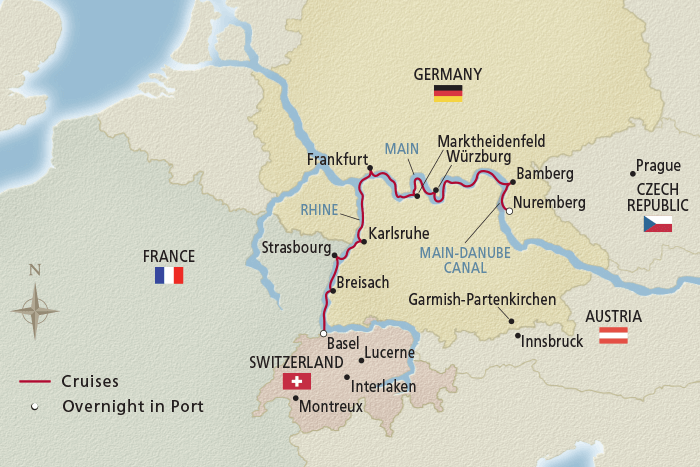Find the River Cruise you’re looking for...
11 Day Viking River Cruise from Nuremberg to Basel 2025
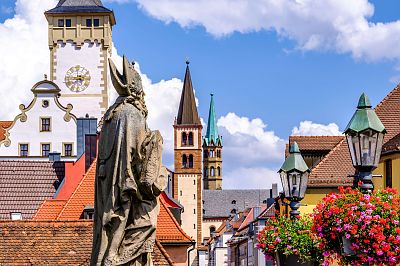
Rhine & Main Explorer
River Cruise Description
Sail through southern Germany and explore neighboring regions in Switzerland and France. Visit Basel, considered the Swiss capital of culture with its charming old town steeped in tradition. Sample flavors of the Alsace region, explore Frankfurt, one of Europe’s high-powered business hubs, and visit lesser-known historic towns in Baden-Württemberg and Bavaria. Turreted castles and a fascinating history exude a rich tapestry of medieval charm.Thanks for your interest!
We'll be in touch soon.Error
I'm sorry, but an error has occurred. Try Again| Departure Date | Ship | Priced From (per person) | |
|---|---|---|---|
| Apr 23, 2025 | Viking Skirnir | Waitlist | Call Us! |
| May 3, 2025 | Viking Modi | Waitlist | Call Us! |
| May 13, 2025 | Viking Skirnir | Waitlist | Call Us! |
| May 23, 2025 | Viking Modi | $3,799 | Call Us! |
| Jun 2, 2025 | Viking Skirnir | $3,799 | Call Us! |
| Jun 12, 2025 | Viking Modi | $3,599 | Call Us! |
| Jun 22, 2025 | Viking Skirnir | $3,799 | Call Us! |
| Jul 2, 2025 | Viking Modi | Waitlist | Call Us! |
| Jul 12, 2025 | Viking Skirnir | $3,199 | Call Us! |
| Jul 22, 2025 | Viking Modi | $3,199 | Call Us! |
| Aug 1, 2025 | Viking Skirnir | Waitlist | Call Us! |
| Aug 11, 2025 | Viking Modi | $3,499 | Call Us! |
| Aug 21, 2025 | Viking Skirnir | $3,799 | Call Us! |
| Aug 31, 2025 | Viking Modi | $3,999 | Call Us! |
| Sep 10, 2025 | Viking Skirnir | $3,999 | Call Us! |
| Sep 20, 2025 | Viking Modi | $3,999 | Call Us! |
| Sep 30, 2025 | Viking Skirnir | $3,999 | Call Us! |
| Oct 10, 2025 | Viking Modi | $4,599 | Call Us! |
| Oct 20, 2025 | Viking Skirnir | $4,299 | Call Us! |
| Oct 30, 2025 | Viking Modi | $3,499 | Call Us! |
| Nov 9, 2025 | Viking Skirnir | $3,199 | Call Us! |
| Nov 19, 2025 | Viking Modi | $3,199 | Call Us! |
River Cruise Itinerary
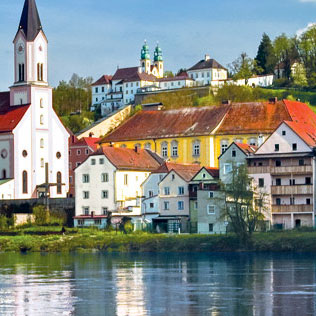
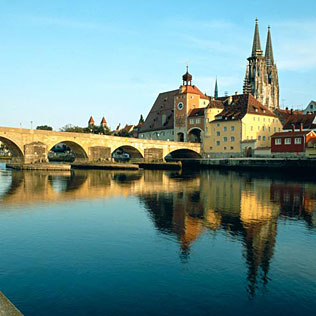
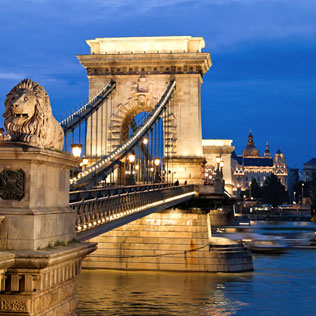
Day 1 Nuremberg, Germany
Embark your ship and settle into your stateroom. The second-largest city in Bavaria, Nuremberg is filled with traditional half-timbered houses and Gothic churches with intricate spires. Although nearly destroyed during World War II, the remaining medieval city walls stretch some three miles and feature original gateways and 80 original watchtowers. Nuremberg is well known historically for its metal and toy craftsmanship. But it is infamous for its role in World War II, first as the site of Zeppelin Field’s Nazi rallies and later as the site of the war crimes trials at the Palace of Justice that captured the attention of a generation.Day 2 Nuremberg, Germany
Within the medieval walls of Nuremberg, Old Town is a place frozen in time. Its rustic half-timbered houses, ornate Gothic churches and cobblestone lanes form a fairy-tale scene. Looming above all is the Imperial Castle, which hosted the coronation of Holy Roman Emperors and the exaltation and entombment of saints. Completed in 1000 AD, it was a formidable fortification and provided a central seat of power for German kings. Nuremberg became the unofficial capital of the empire for 600 years, hosting courts and the Diet, periodic assemblies that shaped policy and strategy.Day 3 Bamberg, Germany
Founded in 902, Bamberg remains a medieval-looking city known for its symphony orchestra and rauchbier, specialty smoked beer. The city’s winding streets are filled with baroque patrician houses and are home to the stunning 11th-century Cathedral of Holy Roman Emperor Heinrich II, housing his tomb and that of Pope Clement II. Bamberg is especially noted for its Altes Rathaus, or Old Town Hall, situated on a twin-arched bridge over the Regnitz River, and for the old bishop’s houses: the 16th-century Alte Hofhaltung (Old Court) and 17th-century Neue Residenz (New Residence).Day 4 Wurzburg, Germany
Surrounded by Franconian vineyards, Würzburg was heavily damaged during World War II, but has since been completely restored. This prestigious university city is a jewel of baroque architecture. Its most pristine example of pomp and glory is the great Bishops’ Residenz palace, built in 1744 for the prince-bishop; his unwavering support of artists is evidenced by the sweeping staircase and magnificent ceiling frescoes by Tiepolo. Other landmarks include the medieval, statue-lined Old Main Bridge and Marienberg Fortress, originally a Celtic hill fort and later residence of the bishops. The city remains a major wine-making center, hosting Germany’s oldest and largest vineyard.Day 5 Marktheidenfeld, Germany
Marktheidenfeld is a picturesque town situated in the Lower Franconia region of Bavaria and boasts a rich heritage that dates back to medieval times. Well-preserved, half-timbered houses line quaint streets and in its heart lies a bustling Marktplatz, or market square, that exudes character and a vibrant atmosphere. Local restaurants serve traditional hearty Bavarian fare, including delicious dishes such as Schweinshaxe (pork knuckle), Kaiserschmarrn (scrambled caramelized pancake) and the more commonly known bratwurst.Day 6 Frankfurt, Germany
Straddling the Main River, Frankfurt has been nicknamed “Mainhattan” for its skyline that resembles that of Manhattan. It is a major financial center and a rich hub of culture, history and architecture. No fewer than nine museums line the Main embankment, covering everything from art to film to ethnology. In the Roman Hill district, Frankfurt’s town hall spreads out over 11 conjoined patrician houses. Emperors were crowned in the Gothic St. Bartholomew’s Cathedral, and remnants from Roman settlements are on exhibit in the city’s Archaeological Garden.Day 7 Karlsruhe, Germany
Blending tradition and modernity, Karlsruhe is one of southwest Germany’s cultural gems. Founded as the Grand Duchy of Baden during the early-18th century, the city is home to the majestic Karlsruhe Palace, from which the city’s streets span forming a distinctive circular layout. Innovation is ingrained in the city’s DNA; it was the chosen destination to establish the world-renowned Karlsruhe Institute of Technology in 2009. Numerous museums, theaters and galleries are popular sights to explore, as well as the peaceful green spaces that offer a serene escape from city life.Day 8 Strasbourg, France
The largest port on the Upper Rhine, Strasbourg is the cultural center of France’s Alsace region. Thanks to its location at the border of France and Germany, it boasts a convivial mix of cultural influences. The well-preserved Old Town is enclosed on all sides by the little Ill River, with sites so compact that it is easy to explore the “island” on foot. And there is plenty to explore: cobblestone streets lined with wooden houses and intersected by picturesque canals. Indulging in Alsatian café culture is central to any visit here; enjoy coffee and cake amid lovely half-timbered houses.Day 9 Breisach, Germany
Breisach is a gateway to the fabled Black Forest region, built on a basalt rock outcropping in the Rhine plain. It is located in one of the warmest parts of Germany, across the river from French Alsace, famous for its wine growing. But Breisach, too, can boast about its wine: it is home to Europe’s largest cellars, with a storage capacity of more than 160 million liters. The most prominent landmark of Breisach is the Romanesque-Gothic St. Stephen’s Cathedral, built between the 12th and 13th centuries. Its two towers are visible from throughout the city and from the Rhine.Day 10 Basel, Switzerland
Located where Switzerland, Germany and France meet, Basel reflects a fascinating blend of traditions. The city straddles the Rhine at the river’s farthest navigable point, and an alluring cluster of old-town buildings huddles along the riverbank. Around Market Square, guild houses recall Gothic, Renaissance and baroque splendor; the red-sandstone Rathaus, or Town Hall, is the centerpiece. More than 40 museums of art and culture lend modern polish to its history-rich streets. And there is no more refined way to sample it all than over cheese fondue or croissants.Day 11 Basel, Switzerland
A delightful blend of old and new, Basel is Switzerland’s best-kept secret. Amid the medieval Old Town, cobblestone streets are lined with pastel-colored buildings that date back to the 15th century. In the heart of the city lies the Jean Tinguely–designed Carnival Fountain. Its mechanical sculptures are in constant motion, seemingly conversing with each other like the mime artists and performers who graced the stage of the old city theater that once stood in the same spot. After breakfast, disembark your ship and journey home.Having trouble deciding which cruise is right for you?

